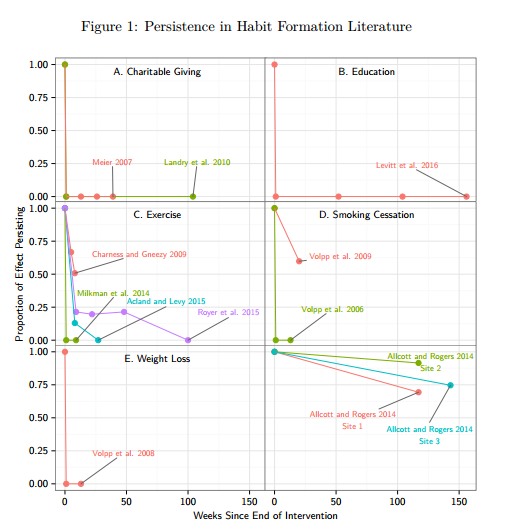Guest post by Jeff Mosenkis of Innovations for Poverty Action.
- ICYMI, there’s a famine affecting 20 million people across a number of countries. From the Guardian, here are some orgs helping (via Rachel Strohm, with the caveat that IPA doesn’t endorse any particular one).
- Happy birthday to the great Development Impact Blog (one of their unsung accomplishments, often amazing discussions in the comments section).
- As shown in the figure above, most nudges for changing habits wear off pretty quickly, except for home energy conservation (last box), according to a new paper by Brandon, Ferraro, List, Metcalfe, Price & Rundhammer.
- A new study finds in the U.S. 1 in 10 pregnant women with Zika have babies affected by the impacts. This is likely an underestimate, based on limited detection of impacts at birth.
- Some scientists speculate that Brazilians experienced higher rates of microcephaly than Americans because of an interaction with dengue, which is closely related to Zika.
- VOA reports a shift in Kenyan families’ strategies to cope with drought – rather than marrying daughters off early to get a dowry, a combination of lower value of cattle (because of their dying in the drought), and social safety net cash transfers from the government has led more families to send their daughters to school. (also via Rachel Strohm)
- There’s finally an (apparently) safe and effective male injectable contraceptive that’s completely reversible, but it’s having a harder time finding it’s way to market than you might think. (h/t Osman Siddiqi)
- Think your students are annoying arguing about grades? A University of Texas government student got a “C” on a paper about constitutional amendments, so he got the U.S. Constitution amended (seriously, it took him 10 years, but he did it.)
I wonder, when GiveDirectly decided to do a Reddit “Ask Me Anything” with three cash transfer recipients in rural Uganda, if GiveDirectly considered what it would be like for them to watch Reddit users mansplain poverty to one another? Regardless, the internet did not disappoint with their questions:
And the debate between Chris Blattman and Lant Pritchett about giving cash vs. chickens got an M. Night Shyamalan-like conclusion:






2 Responses
There’s finally an (apparently) safe and effective male injectable contraceptive that’s completely reversible, but it’s having a harder time finding it’s way to market than you might think. (h/t Osman Siddiqi)
golu dolls
golu dolls
To: Chris Blattman
Subject: Chickens and development econ
I disagree with youir conclusions regarding 300,000 chicken raisers in Africa,
1. Not all 300,000 will have skills and patience to become commercially viable, thus reducing the competition for chickens and eggs. It takes about 6 months for chicks to begin laying eggs.
2. Hens produce 2 to 5 eggs per week, decreasing with age, so the average market is not 100%, but 50-70% productivity, thereby again improving market supply- price issues.
3. Even for those who do not become or choose be be commercially viable would be able to eat the eggs produced. Since the expense of non-commercial chickens is almost 100% labor, the 300,000 would at least have an opportunity to reduce the hunger of their families. By the way, the hens are productive 5 to 7 years, after which they can be eaten.
4. I am not a fan of Mr. Gates or his money. I have won and managed U.S.A.I.D. development contracts. I commercially raised 80,000 chickens on 2 farms. My understanding of the Gates Foundation is they are not a development bank, but a grant funding entity, so anything less than 100% fullfilling expectations would not be borne by the recipients–there should be no future downside, but the likelihood of some beneficial level of success in poverty-hunger is high. If you have opportunity to communicate with Mr. Gates, please refer me as a volunteer to help in his chicken efforts.
5. There is a lot more to the tech and econ of chickens and eggs and I would be glad to discuss and answer any of your concerns on this matter.
Sincerely, Paul
BS UC Berkeley 1970; R&D Silicon Valley ’70s;10 years PhD Environmental studies IIT